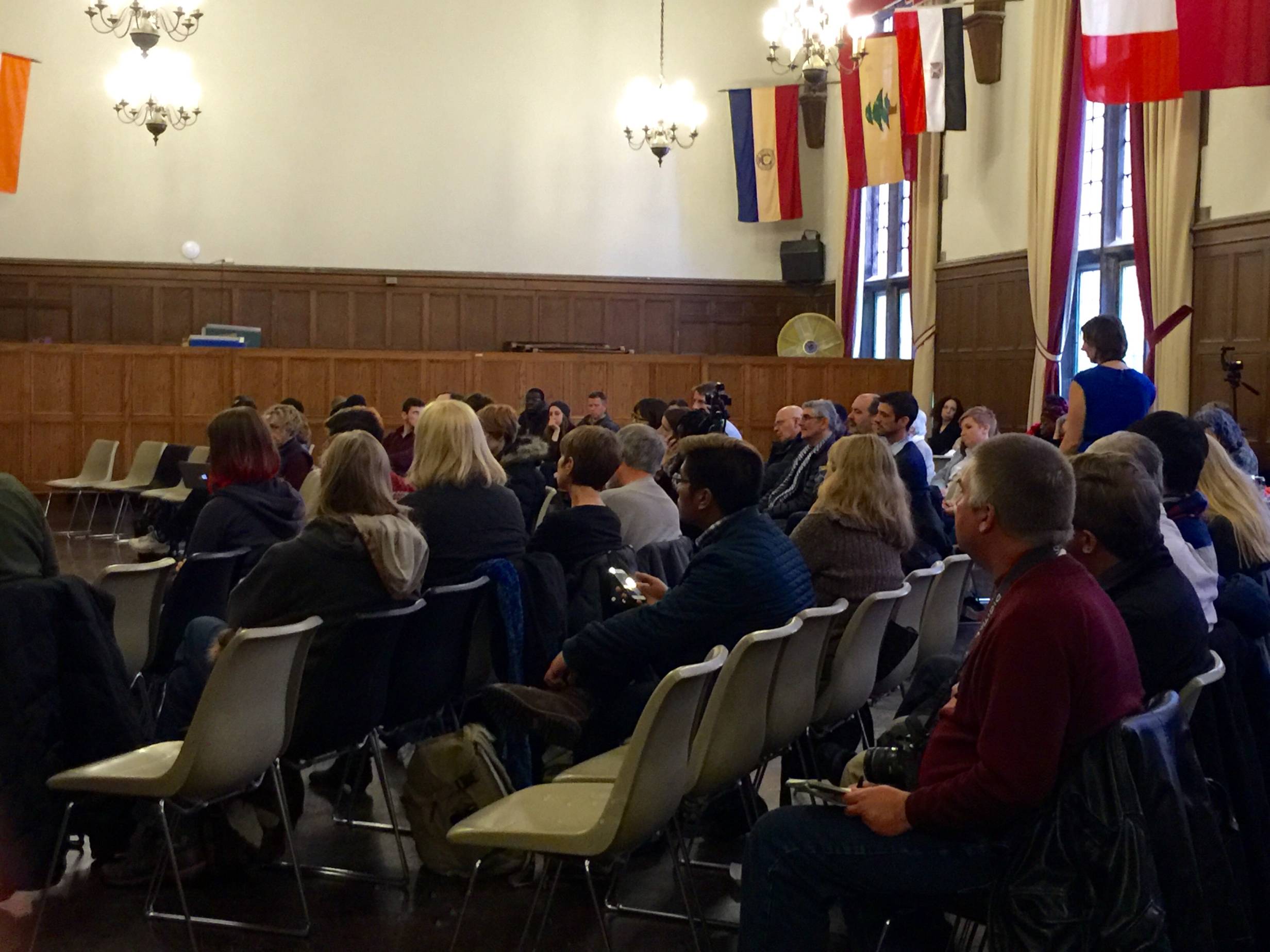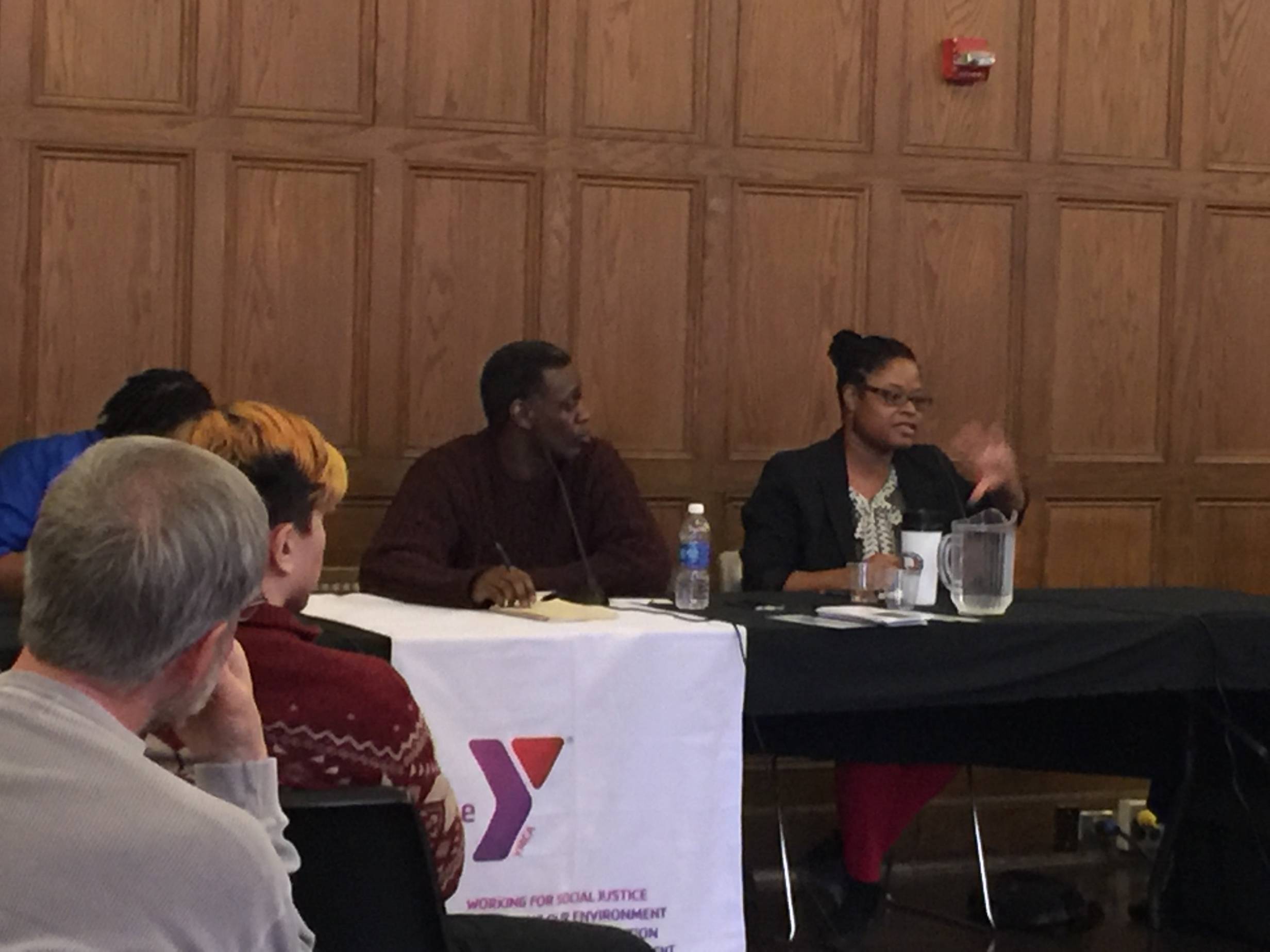A panel composed of three Champaign-Urbana community members discussed their views on the ongoing battle for racial justice both locally and nationally at the University YMCA last Friday.
The Panel on Local Efforts for Racial Justice was open to questions from the audience. It was part of the Spring 2016 Friday Forum Lecture Series titled “Breaking Down Racism: Fighting Racial Injustice in the U.S.,” which builds on the Fall 2015 series by focusing on the specific tools, campaigns, and changes necessary to combat racism and break down the institutional barriers to equality.

All Friday Forum lectures are at 12:00pm at the University YMCA in Latzer Hall, unless otherwise noted. Friday Forum is an initiative of the University YMCA; all Friday Forums are free and open to the public. Information on upcoming events regarding the series can be found on the University YMCA’s website. The original lineup was scheduled to include Aaron Ammons, Evelyn Reynolds, and Marlon Mitchell; Ammons’ wife Carol filled in for him at the last moment. Profiles of the panelists were included on the event’s Facebook page and were mentioned at the beginning of the panel.
Evelyn Reynolds is an Associate Professor of Sociology at Parkland College. Evelyn recently founded Black Lives Matter: Champaign-Urbana, a chapter of the national #BlacklivesMatter organization. While active for less than six months, she said the chapter has learned a lot and that there’s certainly more to come from the group in the future. She is also a member of the organization Build Programs, Not Jails, which has been working in opposition to the construction of new jails in Champaign County.

Marlon Mitchell is a PhD student in Illinois’ College of Education department where his research interests include issues of diversity, inclusion, opportunity, and access. Being a native of Champaign and recognizing the challenges of his community, Mitchell along with a group of volunteer mentors passionately aspire to make a difference in the lives of those who have been justice involved. Before questions took place, Mitchell went into detail about the need for social and educational rehabilitation for those reentering society after incarceration, citing his reentry organization First Followers as one recent effort to solve this issue. The organization will have its one-year anniversary on April 1st.
Carol Ammons is the state representative of Illinois 103rd Legislative District, which includes Champaign-Urbana. Ammons mentioned at the start of the panel that she has been a member of the C-U community for over 17 years. According to the “About” section of her official website, “Ammons looks to bring her experiences as a grassroots community organizer for equality in education, media and technology access and civil rights to her work as a public servant in the House of Representatives.”
Both UIUC students and C-U community members were in attendance, with nearly all the seats filled up by the time the forum started.
The forum began with a question from the audience regarding the recent focus on racial violence against African-Americans in the national media, asking the panel what parallels they saw reflected locally that people were hearing about nationally.
“It’s very difficult to ignore the obvious,” Ammons said, explaining that while the media has done a good job showing the national level of the issue, it has not done a good job holding people accountable. She followed up by saying that there is an anger in the national environment regarding the issues, and that the anger is unfairly being pushed at the at the victims. Reynolds brought up mass incarceration, a big issue in the local area, citing disparities in the local justice system as the main flaw that leads to many of C-U’s incarcerations. Despite this reality, Reynolds is optimistic regarding the determination of the locals to put a stop to these issues: “Nationally it feels very overwhelming, but it’s been nice to figure out ways we can fight it locally.”
Mitchell stated that the problem of mass incarceration of people of color has been going on for generations, mentioning the election of President Barack Obama as the first real advantage in moving against this system. At the state level, Mitchell cited the Governor Bruce Rauner as one of the main forces preventing the Illinois justice system from moving forward. He also mentioned the large number incriminated persons in Illinois coming from the C-U area, asking the audience how their return to life after incrimination would affect the community at large if the proper resources were not available to reincorporate them into society.
Ammons reiterated Mitchell’s point about the governor while answering the second question from the audience, saying that the current climate of Illinois does not lean towards what needs to happen in regards to mass incarceration, stemming from what she believes to be some break in discussion between the governor and the Illinois General Assembly. “It’s important that the people of Illinois make the governor aware of our priorities,” Ammons said. Overall, she is glad the national level is highlighting the corruption that parallels these state issues.
The third question from the audience asked the panel how local efforts could be made to break the school-to-prison pipeline. Reynolds explained that many of these issues are cultural ones that fuel an active suppression of black expression. “It’s interesting to see the treatment of black students compared to other students,” she said, mentioning the prominence of negative stereotypes of black children’s behavior that lead to agitation among school officials and staff.
Reynolds added that recent efforts have been made in C-U public schools to push for workshops, meetings, and conferences to be held regarding these issues.
Ammons cited the that many of the issues that maintain the school-to-prison pipeline start at the home, claiming the children most at risk are from households with low incomes and a one- parent support system. “Schools expect them to act like everything’s okay,” she said in regards to the lack of training school officials have in dealing with the psychological and emotional trauma that can arise from domestic issues. In regards to the economic issues that fuel the pipeline, Ammons explained the gap between the median incomes between white families and black families, saying that the economic system tends to keep African-Americans trapped in low- income statuses that can then create harsh domestic settings.
The fourth question from the audience asked about the panel’s opinion on the differences between the current movement for racial equality compared to the Civil Rights Movement of the 1960s. Ammons stated that from her view, the movement is coming full circle. She pointed to the trend of segregated communities resurfacing in America and a “resurgence of ideals that promote separation of people rather than unification and humanitarian rights of all people.” Ammons also noted her known opposition to Governor Rauner, saying: “Some people believe I don’t like the governor because he’s a Republican. My opposition to the governor is not because he’s a Republican, but because he is an ideologue. An ideologue of a time gone by.” She also mentioned how America at large could be negatively affected: “If we allow the ideologues to take us back to the 1960s policies, you’ll see the unrest grow; the violence will spread.”
Ammons also noted the fact that the current civil rights movement does not have a home like it did in the 1960s. She told the audience that she has seen a recent surge in distrust of non- violent means of protest surfacing among young people who are in the fight for equality. “We are fighting against this mindset,” she said, believing peaceful protest will prevail like it once did.
The next Friday Forum will take place on February 19th, and will host co-founder of the National Black Lives Matter Movement Opal Tometi. It will be held at Allen Hall, 1005 W. Gregory Drive, Urbana, IL.








